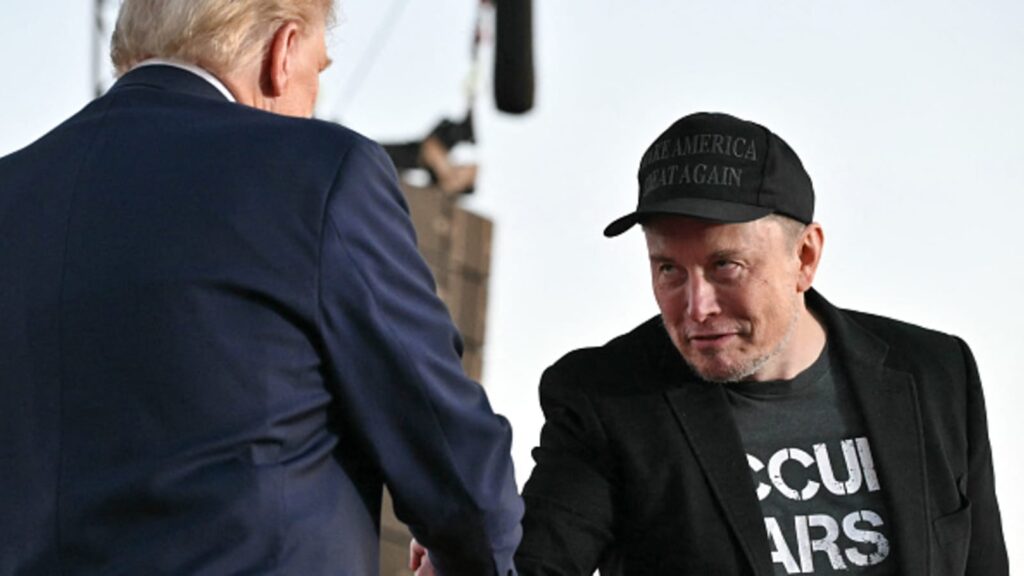WASHINGTON — President Donald Trump launched a fiery personal attack on Elon Musk Thursday, accusing the billionaire of suffering from “Trump Derangement Syndrome” amid their intensifying feud over the Republican Party’s sweeping new spending legislation. The president also threatened to revoke billions in federal subsidies and contracts awarded to Musk’s companies, Tesla and SpaceX.

The clash between the tech magnate and the president marks a dramatic breakdown in their once close working relationship and has rapidly escalated into one of the most consequential power struggles between a sitting president and a top business figure in recent memory.
“Cutting him off is the easiest way to save billions,” Trump posted on Truth Social, referring to Musk’s companies. “Frankly, I was surprised Biden didn’t already do it.”
The feud began earlier this week when Musk, the CEO of Tesla and SpaceX, condemned Trump’s flagship tax-and-spending bill as a “disgusting abomination,” claiming it was packed with wasteful spending and biased against the clean energy sector. The legislation, which includes $350 billion in border enforcement, tax extensions, and cuts to social safety nets, is currently under debate in the Senate after passing the House.
“This massive, outrageous, pork-filled Congressional spending bill is a disgusting abomination,” Musk posted on X. “Shame on those who voted for it — you know you did wrong.”
Musk criticized the rollback of electric vehicle subsidies embedded in the bill and said it unfairly benefits fossil fuel industries while undercutting clean tech, including Tesla’s core business.
At a White House press briefing Thursday morning, Trump fired back, accusing Musk of being disgruntled over the bill’s impact on his financial interests. He dismissed Musk’s influence and claimed the billionaire was bitter after losing access to the administration’s inner circle.
“He used to come around here, used to be helpful, then started losing his mind — classic Trump Derangement Syndrome,” Trump said. He added that Musk’s suggestion of appointing private astronaut Jared Isaacman to lead NASA was “totally inappropriate” and “something only a Democrat would come up with.”
Musk immediately responded online, accusing Trump of turning on him after receiving his backing in the 2024 election. The billionaire, who claims to have donated over $250 million to Trump’s campaign, said he helped secure Republican victories in key battlegrounds.
“Without me, Trump would have lost,” Musk posted. “Such ingratitude.”
The fallout sent shockwaves through markets, with Tesla’s stock plunging as much as 15% on Thursday — following Trump’s threat to terminate federal contracts. The company’s shares had already been sliding due to poor 2025 sales performance and growing investor concern over Musk’s political entanglements.
Trump’s warning could endanger significant streams of funding for Musk’s companies. Tesla has received over $11 billion in regulatory credits and subsidies, while SpaceX, which holds numerous defense and NASA contracts, has drawn more than $22 billion from the federal government, according to estimates.
The standoff places GOP leaders in a precarious position as they attempt to pass Trump’s spending package by his target date of July 4. Senate Majority Leader John Thune has little margin for dissent in the chamber’s slim 53-seat Republican majority.
Although some senators — including Rand Paul and Mike Lee — echoed Musk’s concerns about federal spending, most GOP leaders stood by Trump.
“Elon has a loud voice and a lot of money, but he’s still second fiddle to President Trump,” said Sen. Shelley Moore Capito, R-W.Va.
The Trump-Musk feud has exposed a deeper tension within the Republican Party — pitting the political power of its standard-bearer against the economic clout of its wealthiest backer. While Trump remains the dominant figure among the GOP base, Musk’s influence in corporate and donor circles could complicate the party’s legislative path.
With the Senate fight over the spending bill intensifying and Tesla’s financial fortunes tied to the outcome, the GOP finds itself caught between its two most powerful figures — one in the White House, the other in Silicon Valley.



